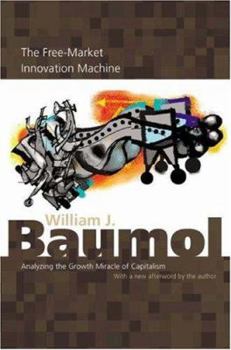The Free-Market Innovation Machine: Analyzing the Growth Miracle of Capitalism
Select Format
Select Condition 
Book Overview
Why has capitalism produced economic growth that so vastly dwarfs the growth record of other economic systems, past and present? Why have living standards in countries from America to Germany to Japan risen exponentially over the past century? William Baumol rejects the conventional view that capitalism benefits society through price competition--that is, products and services become less costly as firms vie for consumers. Where most others have seen this as the driving force behind growth, he sees something different--a compound of systematic innovation activity within the firm, an arms race in which no firm in an innovating industry dares to fall behind the others in new products and processes, and inter-firm collaboration in the creation and use of innovations. While giving price competition due credit, Baumol stresses that large firms use innovation as a prime competitive weapon. However, as he explains it, firms do not wish to risk too much innovation, because it is costly, and can be made obsolete by rival innovation. So firms have split the difference through the sale of technology licenses and participation in technology-sharing compacts that pay huge dividends to the economy as a whole--and thereby made innovation a routine feature of economic life. This process, in Baumol's view, accounts for the unparalleled growth of modern capitalist economies. Drawing on extensive research and years of consulting work for many large global firms, Baumol shows in this original work that the capitalist growth process, at least in societies where the rule of law prevails, comes far closer to the requirements of economic efficiency than is typically understood. Resounding with rare intellectual force, this book marks a milestone in the comprehension of the accomplishments of our free-market economic system--a new understanding that, suggests the author, promises to benefit many countries that lack the advantages of this immense innovation machine.
Format:Hardcover
Language:English
ISBN:0691096155
ISBN13:9780691096155
Release Date:April 2002
Publisher:Princeton University Press
Length:336 Pages
Weight:1.42 lbs.
Dimensions:1.0" x 6.0" x 9.3"
Related Subjects
Business Business & Investing Comparative Economics Free Enterprise Popular Economics TheoryCustomer Reviews
2 ratings
Packed with Knowledge!
Published by Thriftbooks.com User , 20 years ago
This book should certainly be on every businessperson's reading list, and every legislator's, and every student's. It is a lucid, well-organized and admirably logical presentation of the role of innovation in capitalism, and the role of capitalism in innovation. Author William J. Baumol accomplishes something rare indeed by spanning the chasm between quantitative and qualitative economic writing. He has the verbal skill to write clearly and accessibly, explaining his points in plain if elevated and austere language, and illustrating them with interesting historical examples. His rigorous mathematical demonstration would satisfy the most demanding academic economist. Baumol's insight that capitalism's great achievement is to make innovation routine distinguishes this book from others on innovation, entrepreneurship and creativity. Although the lone inventor matters, ancient Rome and China had lone inventors and yet those empires did not produce economic growth on the scale that capitalism has produced it. Capitalism is distinctly productive because it makes innovation a self-sustaining and indispensable phenomenon, driving and driven by competition. We find this intriguing thesis well worth serious consideration.
Good Book on Necessity of Institutional Rules
Published by Thriftbooks.com User , 21 years ago
"The thesis of William J. Baumol's latest book is articulated clearly at the start. The free-market growth engine depends ultimately on institutional rules. People may have a natural entrepreuneurial instinct, but that instinct can find outlet in criminal, rent-seeking, or other destructive activities as easily as in productive venues. Economic growth depends, however, on more than just rules and norms that channel such inclinations in the "right" direction. It depends also on rules governing the appropriation of intellectual property and on the precise trade-off a society makes between pricing information at its marginal cost (making it free) and providing incentives for invention and innovation by creating rules to allow appropriobility for fixed periods of time. We call this body of rules patent, copyright, and, in general, intellectual property law (although, as Baumol argues, antitrust is also relevant). The dilemma is that in the absence of such protection there are few private incentives for producing new information or discoveries, but in the presence of such protection we impose monopoly pricing and, consequently, static efficiency losses.""The first section of the book, devoted to the "capitalist growth mechanism," is the most interesting. Here Baumol develops his vision of a capitalist economy as consisting of competitive price-taking sector and an oligopolistic sector in which competition occurs more often on the innovation margin rather than on the price margin. The pharmaceutical and computer industries are cases in point. This oligopolistic sector is the economy's engine of growth. Firms here must innovate or they die; they also must price discriminate or die because the heavy fixed costs of innovation cannot be covered if everyone pays a price equal to marginal cost. These costs must be recouped in the same way that railroads were forced to price discriminate to cover their fixed costs for rolling stock and permanent way. Baumol cautions antitrust authorities against jumping to the conclusion that departures from marginal-cost pricing are necessarily evident of monopoly power.""As Baumol's book proceeds, it devotes a generally increasing share of space to formal models...[and] it was somewhat dissapointing...to discover how much of the second half of the book is devoted to model building as opposed to discussion..."






